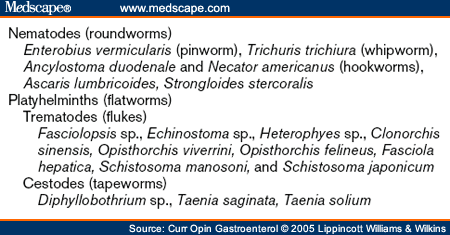IBD and Helminths - Detail

Why worms?
Economic development leads to many changes in environmental exposures. Among these include exposure to artificial light, air conditioning, television, refrigeration, fast foods, concentrated sweets, antibiotics, and childhood vaccination, to name a few. However, most of these candidate exposures do not appear to confer risk of IBD on detailed investigation. Beginning in the mid-1990s, we developed the hypothesis that loss of exposure to parasitic worms (helminths) increases the risk of IBD.[35] Helminths are transmitted most efficiently where sanitation is poor. Economic development brings running water, sewage treatment, and hygienic farming practices that prevent the spread of helminths. Hard winter freezes can impede helminth transmission accounting for north-south gradients. Today, helminth carriage is rare in locations where IBD is common, and helminths are common where IBD is rare.

Table 1.
There are many types of helminths ( Table 1 ) that are classified as nematodes (roundworms), trematodes (flukes), and cestodes (tapeworms). Helminths are complex multicellular organisms that make foreign proteins, lipids, and metabolites recognized by the immune system. Helminths are unique in their capacity to induce Th2 immune responses. Th2 responses serve the host by limiting the degree of helminthic colonization.[36] To survive, worms have developed methods to evade immune-mediated destruction.[37] Furthermore, helinths may actually benefit from the host's immune response. For example, Schistosoma mansoni depends on the host's immune response to help its eggs escape from the body.[38] People have had helminths for many millennia.[39] After eons of coevolution, it becomes difficult to say whether the immune system controls the helminth or the helminth controls the immune system.
Helminths alter immune responses beyond those directed against the worms. People carrying helminths show immune bias away from the Th1 response normally elicited with tetanus vaccination[40] or in vitro mitogen stimulation.[41] Mice harboring helminths have depressed Th1 and augmented Th2 responses to test antigens[42,43] and mycobacteria.[44]
Helminths regulate their host's immune system. They appear to accomplish this task through multiple mechanisms[45*] including release of compounds that trigger IL-10[46] or preventing IL-12 and tumor necrosis factor a[47] production, release of actual mediators such as prostaglandin E2,[48] and release of cytokine mimics such as TGF-β-like molecules.[49] Helminth induction of immune regulatory circuits impedes Th1 and possibly even aberrant Th2 responses.[50**,51] This makes our recent loss of helminth exposure a strong environmental candidate to explain the increased prevalence of IBD.
Helminths and the Modulation of
Mucosal Inflammation
This paper was obtained from Medscape. Our understanding is that it because it was freely available that it is ok to publish it here with attribution. If this is not the case please let us know and we will remove it immediately.
